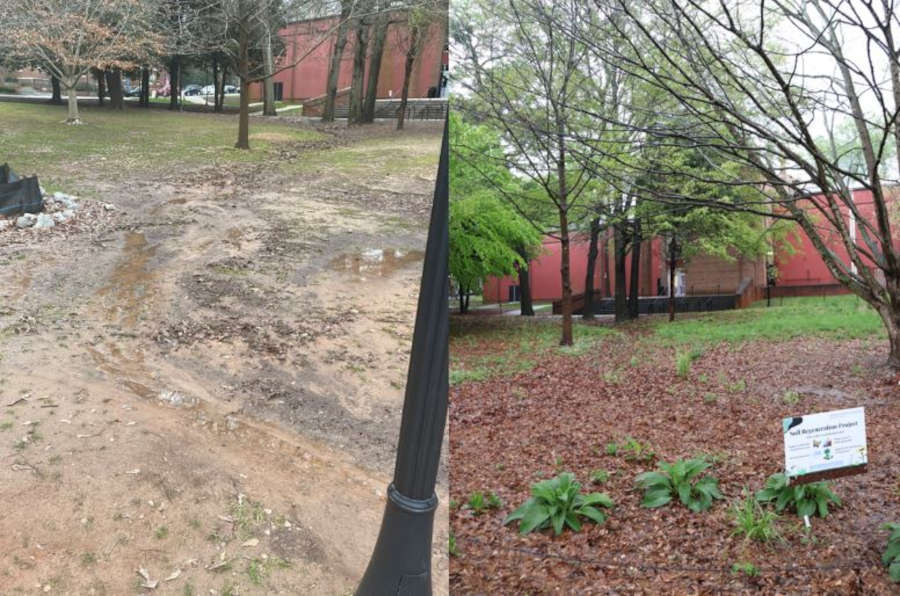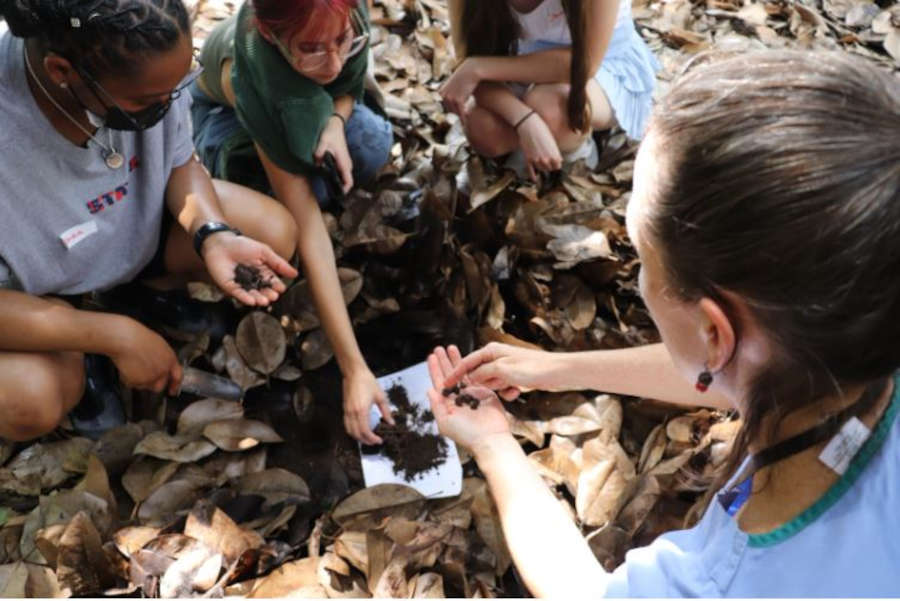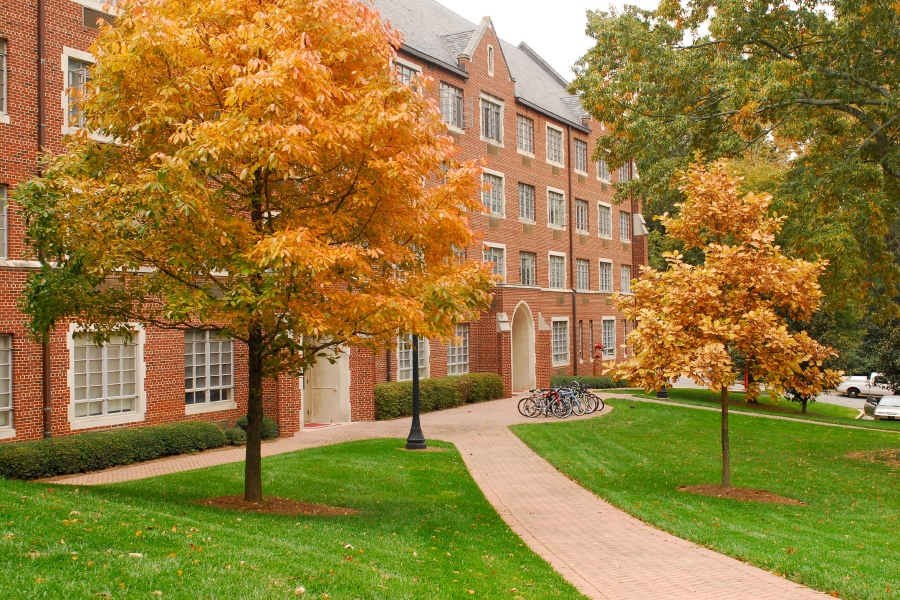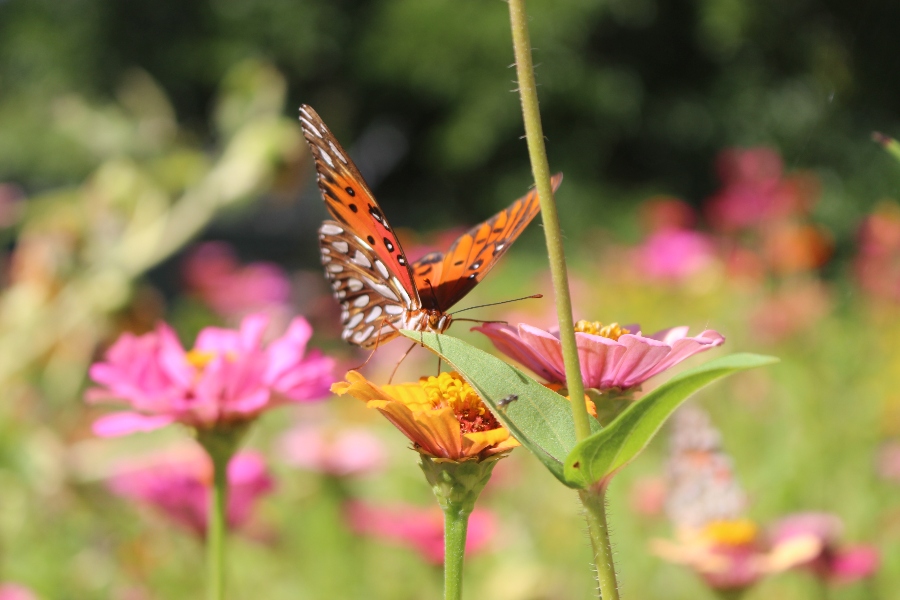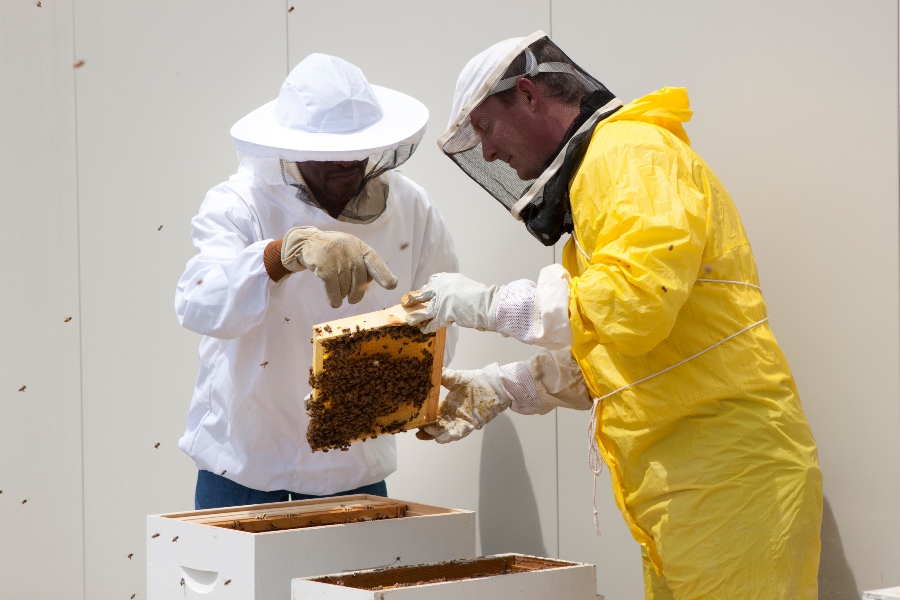The combination of treescape and grounds at Agnes Scott give the college its well-known feeling of being “transported” from the surrounding city. Our landscape spans roughly 100 acres. The south side of campus is mostly untouched and is known as our "woodlands" area.
The department of Facilities largely manages the college’s landscape with outside contractors who focus on lawn maintenance, tree care, and tree pruning. The primary portion of landscape care is done in the main campus area where residential halls and academic buildings are located. The work done in the south side of campus is mostly the removal of dead trees and invasive species.
Facilities and the Center for Sustainability work together to enhance the sustainability of the landscape to fit the goals of the college. Examples include planting native and drought-resistant ground cover plants and trees, removing invasive species using goats, volunteer efforts to avoid using fossil-fueled machinery, and maintaining more than 50% tree canopy across campus. Read more in our campus landscape annual report.
The Soil Regeneration Project at Agnes Scott College is an interdisciplinary collaboration among students, faculty, staff, and local community members to apply hands-on learning to climate action. Regenerating the biodiversity and health of urban soils is an essential strategy to achieve climate resilience – on a campus, as well as on a global scale.
In 2021, four undergraduate STEM Scholars conducted a summer pilot study with the goals of establishing baseline measurements of soil health on the ASC campus and using this evaluation to inform the college’s strategy for achieving carbon neutrality by 2037. This conceptual puzzle took an urgent practical turn when the students observed the heavy erosion occurring at the time in the Woodruff Woods, the one-acre landscape nestled between Woodruff Physical Activities Building, Demonstration Garden, Byers Tennis Courts, and Gellerstedt Track & Field. Not satisfied with reporting the pilot study findings at the end of the summer, one of the students decided to continue researching the field – first to quantify the erosion, and then to find a way to restore the health of the soil. The Soil Regeneration Project began from this work in spring 2022.
Since summer 2021, this field has been under continuous study and care by many students and ASC groups. This project has fueled student research and presentations, community service, classroom curricula, and interdisciplinary collaborations:
- 2021 STEM Scholars Program Research Symposium (lightning talk)
- 2021 Women’s Global Leadership Conference (poster)
- 2021-2022 The Dish on Dirt (lunch and learn series)
- 2021-2024 subject for curricula in undergraduate and graduate courses (ESS, HCD, Pippins?)
- 2021-2024 Earth Day soil health demonstration table & regen book raffle
- 2022 Spring Annual Research Conference (talk)
- 2023 ASC Community Day Project
- 2023-2024 Fridays in the Field (ongoing community service project)
- 2024-2025 Friends in the Field Irvine series on beneficial plants and native species
- 2024-2025 collaboration with the Portman Project in Creative Arts
How to Get Involved!
- Sign up to volunteer on ScottieServe. We need volunteers of all kinds and welcome all interests and knowledge levels.
- Students, engage with People for Pollinators and SEEDS. Both organizations work closely with the Soil Health & Regeneration Project and there’s lots of room for more research questions and community engagement.
- Check out “Friends in the Field”, our on-going announcement in the Irvine of plants of interest throughout the seasons.
All 2,000+ trees on campus make-up the Agnes Scott Arboretum, a collection of woody plants for display, education, and research. The college’s tree canopy is maintained between 45-55% in compliance with the City of Decatur’s Tree Canopy Conservation Ordinance.
The college has been a certified Tree Campus USA since 2012 and has applied for re-certification annually. It is also a Level II accredited arboretum certified by ArbNet since 2019. This designation requires having 100 or more unique species of trees and meeting arboreta and landscape practices required for Level II certification. No other international program of accreditation exists that is specific to arboreta. Every year in February, Agnes Scott adds to its collection of trees by planting honor trees in celebration of Georgia’s Arbor Day. Employees of the college with 25+ years of service can opt to have a tree planted in their name. A current list of honorees can be found on the Arboretum website here.
The Arboretum itself is a reflection of Agnes Scott’s liberal arts curriculum. Staff and faculty from different departments—classics, art, biology, anthropology, environmental and sustainability studies, women’s gender and equality studies—facilities, ITS, communications and sustainability came together to create it. They also developed its website, tours, and the Arboretum Advisory Committee in 2012.
The college uses a consulting arborist to provide the best decisions in terms of care, tree species and planting placement, and risk assessments. With guidance from our 2020-2025 Tree Care Plan, the plan contains information about all aspects of the arboretum, including best management and care practices, education and service goals, the honor tree program, ecosystem services benefits of trees, and tips for other institutions to create their own tree care plan. Check out the full list of programs, projects, certifications, ways to engage and the 17-location walking tour on the Arboretum website here.Our organic demonstration garden is a fantastic way for students to see the true origins of their food. While the types of crops vary by season, past harvests have included kale, garlic, onions, arugula, beets, and swiss chard.
Because of the garden’s placement near the college's athletics complex, families and Decatur community members passing by can also benefit from the garden. Visitors to the garden also include many different types of pollinators that come to feed and rest among the variety of flowers and herbs. It's easy to get lost in all the buzz in the spring and summer times. The pollinator garden engages students passionate in preserving and protecting pollinators, such as those in Agnes Scott’s People for Pollinators and SEEDS clubs. It is also a place for citizen science to take place during the pollinator census every August with interested members of the Agnes Scott community.
Though the garden is too small to supply food to Agnes Scott’s dining hall, the yield of the harvests often make their way into the kitchens of students, faculty, and staff, making sure that our community benefits from the local, organic produce that the garden provides!
- Establish/maintain a Bee Campus USA Committee or Subcommittee
- Develop and maintain a Campus Pollinator Habitat Plan to include a locally native (indigenous to your ecoregion), pollinator-friendly plant list with regional sources for such plants and an integrated pest management (IPM) plan. The plant list and IPM plan should be publicized and available on the web to offer a valuable landscape-management model applicable to other local landscapes.
- Host an annual campus event(s) to raise awareness of the importance of pollinators
- Annually sponsor and track student service-learning
- At least biennially offer a pollinator protection course
- Post signage regarding pollinators
- Maintain a webpage on the institution’s website to share your Bee Campus USA news and activities
- Agnes Scott's 2022-2023 Bee Campus USA submission

